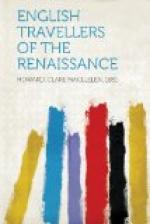One of the particular ways of serving one’s country was the writing of “Observations on his Travels.” This was the first exercise of a young man who aspired to be a “politicke person.” Harington promises to send to Prince Henry whatever notes he can make of various countries. Henry Wotton offers Lord Zouche “A View of all the present Almagne princes."[72] The keeping of a journal is insisted upon in almost all the “Directions.” “It is good,” says Lord Burghley to Edward Manners, “that you make a booke of paper wherein you may dayly or at least weekly insert all things occurent to you,"[73] the reason being that such observations, when contemporary history was scarce, were of value. They were also a guarantee that the tourist had been virtuously employed. The Earl of Salisbury writes severely to his son abroad:
“I find every week, in the Prince’s hand, a letter from Sir John Harington, full of the news of the place where he is, and the countries as he passeth, and all occurents: which is an argument, that he doth read and observe such things as are remarkable.”
This narrative was one of the chief burdens of a traveller. Gilbert Talbot is no sooner landed in Padua than he must write to his impatient parents and excuse himself for the lack of that “Relation.” “We fulfil your honour’s commaundement in wrytynge the discourse of our travayle which we would have sent with thes letres but it could not be caryed so conveniently with them, as it may be with the next letres we wryte."[74] Francis Davison, the Secretary’s son, could not get on, somehow, with his “Relation of Tuscany.” He had been ill, he writes at first; his tutor says that the diet of Italy—“roots, salads, cheese and such like cheap dishes”—“Mr Francis can in no wise digest,” and after that, he is too worried by poverty. In reply to his father’s complaints of his extravagance, he declares: “My promised relation of Tuscany your last letter hath so dashed, as I am resolved not to proceed withal."[75] The journal of Richard Smith, Gentleman, who accompanied Sir Edward Unton into Italy in 1563, shows how even an ordinary man, not inclined to writing, conscientiously tried to note the fortifications and fertility of each province, whether it was “marvellous barren” or “stood chiefly upon vines”; the principal commodities, and the nature of the inhabitants: “The people (on the Rhine) are very paynefull and not so paynefull as rude and sluttyshe.” “They are well faced women in most places of this land, and as ill-bodied."[76]
Besides writing his observations, the traveller laboured earnestly at modern languages. Many and severe were the letters Cecil wrote to his son Thomas in Paris on the subject of settling to his French. For Thomas’s tutor had difficulties in keeping his pupil from dog-fights, horses and worse amusements in company of the Earl of Hertford, who was a great hindrance to Thomas’s progress in the language.[77] Francis Davison hints that his tour was by no means




